Feast of Feasts
Advent, Christmas, and Epiphany
with St. Francis
Menu Links
Contact Us
18 East 34th Street
Savannah, Georgia 31401
Advent 1 – Humility
Francis of Asissi longed to follow Jesus in a life grounded in profound humility. In the Second Person of the Holy Trinity becoming human, the Incarnation, Francis found this ideal of humility made complete, so that Christmas was the pinnacle of the church year. Thomas of Celano wrote that “Francis observed the birthday of the child Jesus with inexpressible eagerness over all other feasts.”
We read of the humility that is at the heart of the Incarnation in Philippians (2:3-8), “Let the same mind be in you that was in Christ Jesus, who, though he was in the form of God, did not regard equality with God as something to be exploited, but emptied himself, taking the form of a slave, being born in human likeness. And being found in human form, he humbled himself and became obedient to the point of death— even death on a cross.”
For Francis, if even God could humble himself in taking on humanity, how much more should we who follow Jesus do the same?
Sunday – A Franciscan Story
“Do nothing from selfish ambition or conceit, but in humility regard others as better than yourselves. Let each of you look not to your own interests, but to the interests of others.” -Philippians 2:3-4
Francis of Assisi was born into the age of chivalry when troubadours entranced their audiences with stories of heroic knights and the virtues of courtly love. These songs became deeply influential for Francis, the son of a wealthy textile merchant. His friend and early biographer, Bonaventure, would write that Francis was reared “in vanity amid the vain sons of men.”
Francis saw an opportunity for the glory found in battle when, at 20, he and other young men from Assisi enlisted to fight against the neighboring Umbrian hill-town of Perugia. Assisi lost the battle. Francis was imprisoned for a time. Defeat in battle and the illness that followed in prison caused Francis to turn away from all notions of finding glory in combat.
Later, on a pilgrimage to Rome, Francis saw a beggar outside of St. Peter’s Church. The Holy Spirit moved him to trade places with a beggar. Francis exchanged clothes with the man and then spent the day begging for alms. That experience of poverty shook Francis to the core. He would in time find his ideals of courtly love in the Blessed Virgin Mary and in Lady Poverty. In them, Francis saw the paradoxes of the Gospel—richness in poverty, life in death, strength in weakness.
Within his lifetime Francis would rise to a fame that would have pleased his younger self, but he was dismissive of his having accomplished anything. Outwardly, this was far from true. By the time of his death, Francis had accomplished much by any standard. Francis’ followers became the Order of Friars Minor. The group was endorsed by the Church and a similar order was established for women, and yet a third for married persons who wanted to keep a rule of simplicity appropriate to them.
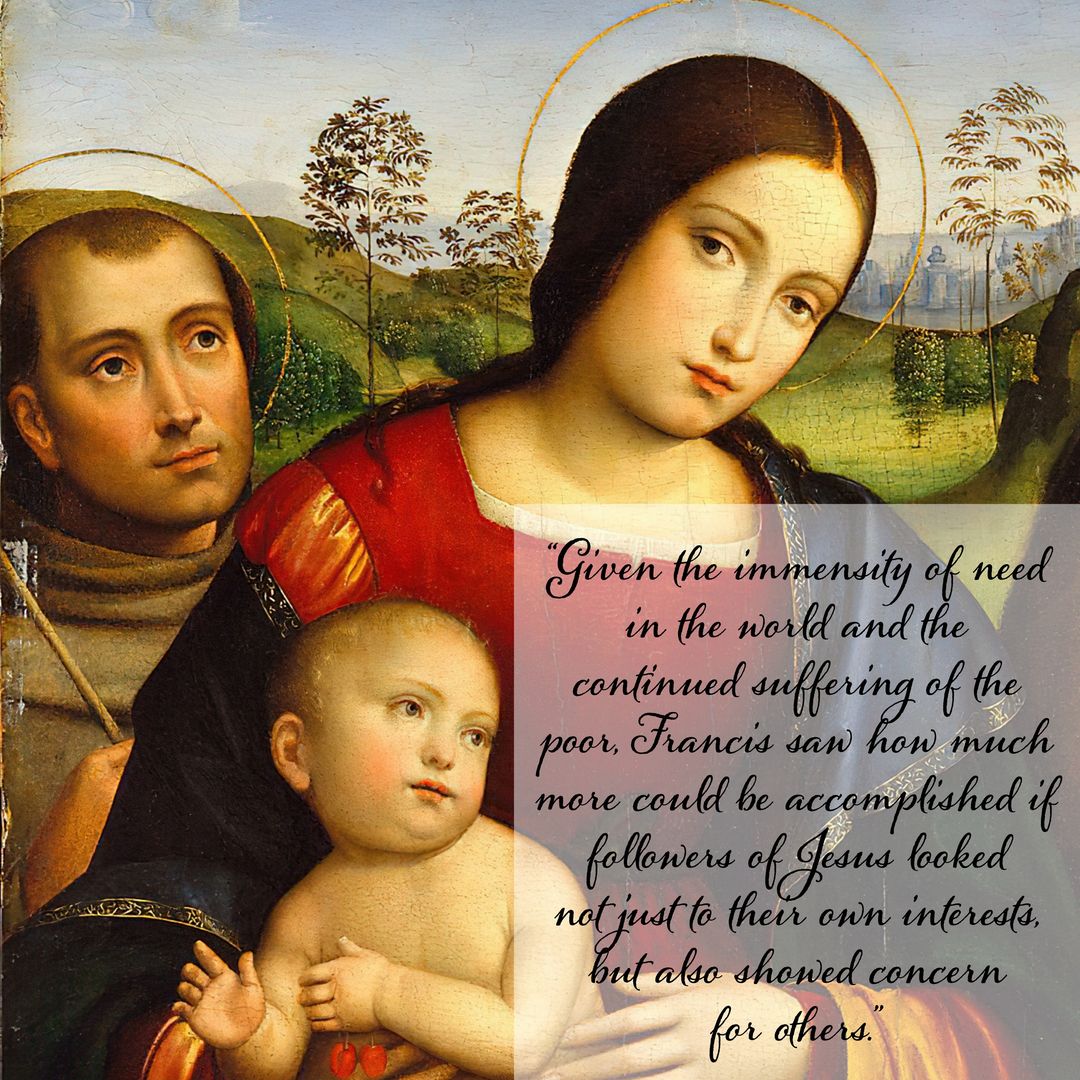 Francis could see the thousands of lives transformed by his call for deep repentance and radical simplicity of life. Francis’ own example of a Christ-like life transformed the Italy of his youth within his own lifetime. Yet he continued to see himself rightly, not considering himself more than he should. This is why from his deathbed, Francis said to his fellow friars, “Let us begin, brothers, to serve the Lord our God for up to now we have made little or no progress.”
Francis could see the thousands of lives transformed by his call for deep repentance and radical simplicity of life. Francis’ own example of a Christ-like life transformed the Italy of his youth within his own lifetime. Yet he continued to see himself rightly, not considering himself more than he should. This is why from his deathbed, Francis said to his fellow friars, “Let us begin, brothers, to serve the Lord our God for up to now we have made little or no progress.”Given the immensity of need in the world and the continued suffering of the poor, Francis saw how much more could be accomplished if followers of Jesus looked not just to their own interests, but also showed concern for others. Our journey through Advent to Christmas and beyond is not about beating ourselves up. Humility is found in right-sizing how we see ourselves. Once we get realistic about ourselves, we can make changes to become more Christ-like as we look not just to our own interests, but to those of others.
Monday – A Prayer
 Almighty and eternal God, your Son our Savior Jesus Christ emptied himself to be born in human form and humbled himself and became obedient to the point of death, even death on a cross. Grant us the grace to see ourselves rightly and give to us the strength of purpose to so love our neighbors as ourselves that we look not to our own interests, but also to the interest of others. This we pray that the same mind may be in us that was in Christ Jesus, who lives and reigns with you and the Holy Spirit, one God, now and forever. Amen.
Almighty and eternal God, your Son our Savior Jesus Christ emptied himself to be born in human form and humbled himself and became obedient to the point of death, even death on a cross. Grant us the grace to see ourselves rightly and give to us the strength of purpose to so love our neighbors as ourselves that we look not to our own interests, but also to the interest of others. This we pray that the same mind may be in us that was in Christ Jesus, who lives and reigns with you and the Holy Spirit, one God, now and forever. Amen.
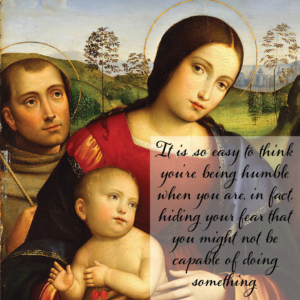 In our Lenten devotional, A Spring in the Desert, I wrote about confusing low self-esteem with humility. In the Principles that are a part of the rule for the Third Order, Society of Saint Francis, Day Twenty-four states: “Nevertheless, when asked to undertake work of which we feel unworthy or incapable, we do not shrink from it on the grounds of humility, but confidently attempt it through the power that is made perfect in weakness.”
In our Lenten devotional, A Spring in the Desert, I wrote about confusing low self-esteem with humility. In the Principles that are a part of the rule for the Third Order, Society of Saint Francis, Day Twenty-four states: “Nevertheless, when asked to undertake work of which we feel unworthy or incapable, we do not shrink from it on the grounds of humility, but confidently attempt it through the power that is made perfect in weakness.”It is so easy to think you’re being humble when you are, in fact, hiding your fear that you might not be capable of doing something.
But, before that, Day Twenty-Three notes: “Humility confesses that we have nothing that we have not received and admits the fact of our insufficiency and our dependence upon God. It is the basis of all Christian virtues. Saint Bernard of Clairvaux said, ‘No spiritual house can stand for a moment except on the foundation of humility.’ It is the first condition of a joyful life within any community.” And that is whether the community is your own home, where you work, or your church.
I remember once that I put a lot of time and effort into putting on an event and was quite proud when I saw that it was going well. And yet, when it was over, someone else claimed the credit for its success. My first reaction was anger. “What am I? Chopped liver?” I thought. But, by this point, I had been a Franciscan for a number of years. I gritted my teeth, took a deep breath, and reflected instead. Would it change anything in a helpful way if I spoke up or let it be known that I had done most of the work? The answer was ‘no’. No, it wouldn’t. In fact, it would probably only embarrass the person receiving the accolades and cause a rift in our relationship.
So, I said nothing. And now, years later, I can no longer even remember the details of the event or who it was that allowed themselves to be congratulated on the work done. Sometimes humility is simply not saying anything.
Questions for reflection
Have you ever been given credit for something someone else has done? Or alternatively, not taken the credit when it should have been yours? How did you feel and what did you do about it?
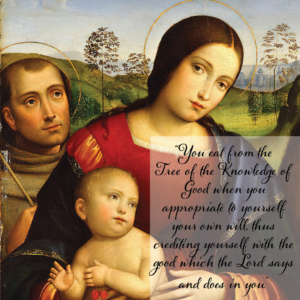 “You eat from the Tree of the Knowledge of Good when you appropriate to yourself your own will, thus crediting yourself with the good which the Lord says and does in you.”
“You eat from the Tree of the Knowledge of Good when you appropriate to yourself your own will, thus crediting yourself with the good which the Lord says and does in you.”–Saint Francis in the Admonition, 2
Questions for reflection
Have you ever taken more credit for something than you should have?
And, as Francis notes, do you feel that the good things you have done are done by your will alone or do you give God credit for helping you to see that you are capable of goodness?
 Humility is a right view of oneself, that is neither prideful nor self-abasement. This is true for all of what are called the seven deadly sins. There is a healthy mid-point that is the goal and the sin lies on either side of that moderation. For example, gluttony is usually thought of as the sin of eating too much, and it is. But, according to Saint Augustine’s Prayer Book, gluttony can also be expressed in eating too little, such as in the eating disorder anorexia. A healthy appetite is good. Gorging on too much food or erring toward self-denial both fall short of the mark. In this same way, pride can be expressed in being all about yourself, taking up too much space, barging in on every conversation. But that same error is seen in holding back your gifts and failing to bring your whole self, with all the gifts God has given you.
Humility is a right view of oneself, that is neither prideful nor self-abasement. This is true for all of what are called the seven deadly sins. There is a healthy mid-point that is the goal and the sin lies on either side of that moderation. For example, gluttony is usually thought of as the sin of eating too much, and it is. But, according to Saint Augustine’s Prayer Book, gluttony can also be expressed in eating too little, such as in the eating disorder anorexia. A healthy appetite is good. Gorging on too much food or erring toward self-denial both fall short of the mark. In this same way, pride can be expressed in being all about yourself, taking up too much space, barging in on every conversation. But that same error is seen in holding back your gifts and failing to bring your whole self, with all the gifts God has given you.Questions for reflection
As you consider the ways in which you serve others, using the gifts you have been given, are there ways in which you have been holding back?
In what way might you offer more of your unique gifts to bear in serving others?
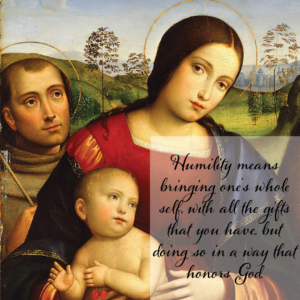 I suspect that humility is rarer than I care to admit among those elected and ordained as bishops. I certainly have bishop colleagues in whom I see no signs of vainglory. Yet, one does not trip and fall and find oneself in a bishop’s election by accident. And the election process requires one to demonstrate some qualities that seem Episcopal. Without a bit of “look at me” on the part of a priest, our current process of selecting a chief pastor is unlikely to end up with the more self-effacing priest on the slate of nominees.
I suspect that humility is rarer than I care to admit among those elected and ordained as bishops. I certainly have bishop colleagues in whom I see no signs of vainglory. Yet, one does not trip and fall and find oneself in a bishop’s election by accident. And the election process requires one to demonstrate some qualities that seem Episcopal. Without a bit of “look at me” on the part of a priest, our current process of selecting a chief pastor is unlikely to end up with the more self-effacing priest on the slate of nominees.If you know me at all, you know that I am certainly chief among those who say, “Look at this thing I wrote!” or “Here is a photo I took!” So, I am not pretending to have nailed the humility that was central to the poor man of Assisi. But what I have noticed is that Jesus’ teaching on humility is simply true, and we ignore it at our spiritual peril. He said, “All who exalt themselves will be humbled, and all who humble themselves will be exalted.” This is how life works. When I get, in the parlance of my childhood, “too big for my britches,” there is some humbling experience that will find me.
I was on the planning team for Evangelism Matters in 2016. The Rev. Alex Montes-Vela and I were asked to close out the gathering with a look back at the conference, naming what we had heard in the gathering. This meant that throughout the conference, we looked for the markers of the Holy Spirit where common threads wove through the meeting in presentations made by persons who did not know what the others would be saying. I did a little wrap-up with quotations from presenters, and Alex brought it home with a touching story that connected it all in a powerful way. The presentation seemed to work for the attendees. I was proud of what we had done. Not that there is anything wrong in feeling good about a job well done, but in retrospect, I was a little too impressed with myself. When asked to do the wrap-up for Evangelism Matters 2018, my part of the presentation was a little too cute, show-offy in a way not as subtle as I’d hoped. I hit the wrong notes right as the conference was concluding. Fortunately, the Rev. Canon Stephanie Spellers sensed this on the fly and course-corrected by saying more as she took the floor to offer a closing prayer and blessing that ended the meeting. Otherwise, we would have sent attendees out on a sour note. I knew I had messed up. And I knew the failure came out of being impressed with myself.
As I reflect on this, I see the many times I have let myself get a big head and, consequently failed to prepare correctly or discern the right tone. At such times, my efforts have routinely fallen flat in ways that reflect on those who trusted me to bring my whole self, but not my whole prideful self. I have learned that I can get the presentation Advent, Christmas, and Epiphany with St. Francis right, but only when I keep my pride in check and discern what God wants me to do or say.
Humility means bringing one’s whole self, with all the gifts that you have, but doing so in a way that honors God.
Questions for reflection
Have you found yourself humbled when your ego takes center stage?
How have you held back from offering all the gifts you bring?
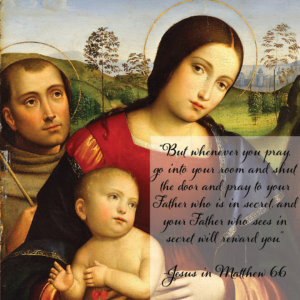 “But whenever you pray, go into your room and shut the door and pray to your Father who is in secret, and your Father who sees in secret will reward you.”
“But whenever you pray, go into your room and shut the door and pray to your Father who is in secret, and your Father who sees in secret will reward you.”-Jesus in Matthew 6:6
Naturally, that doesn’t mean we shouldn’t worship in community, that is, go to church regularly. What it does mean, though, is that when we are in church, we should be careful not to bring undue attention to ourselves.
Cynthia Bourgeault, a modern-day mystic, Episcopal priest, writer, and internationally-acclaimed retreat leader, tells a story in her book, Chanting the Psalms, that is a good example of humility in worship.
She writes, “Everyone sings with a slightly different vocal instrument, and the beauty comes in blending them together through a subtle give-and-take. You also have to be aware of the space that the person next to you is taking up and avoid the temptation to wander off into a personal emotional high. I remember one evening at vespers with the monks at Saint Benedict’s [monastery in Colorado] when I was so pleased that I knew a particular psalm tone well that I started singing with wonderful drama and verve, having myself a grand old time. Afterward, one of the monks pulled me aside and said very sweetly but pointedly, ‘My choirmaster once told me, if you can’t hear the person next to you, you’re singing too loud.’”
Fortunately, Episcopal worship tends to be a very give- and-take style of worship, but it does offer opportunities to make a spectacle of oneself.
Question for reflection
Can you think of other ways in which to humble yourself in worship?
